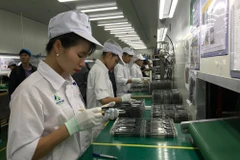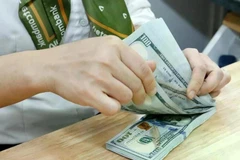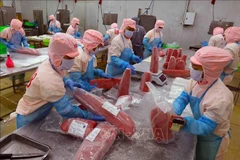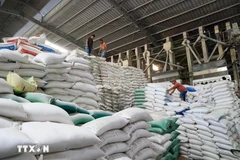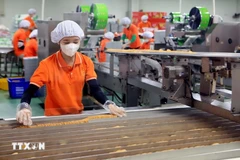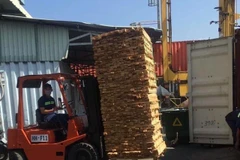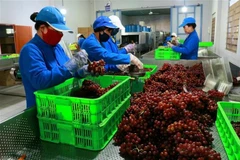Hanoi (VNA) - In the context of complicated developments of the COVID-19 pandemic, supermarkets, trade centers and traditional markets have closely linked together to boost the sale of agricultural products and locally made goods.
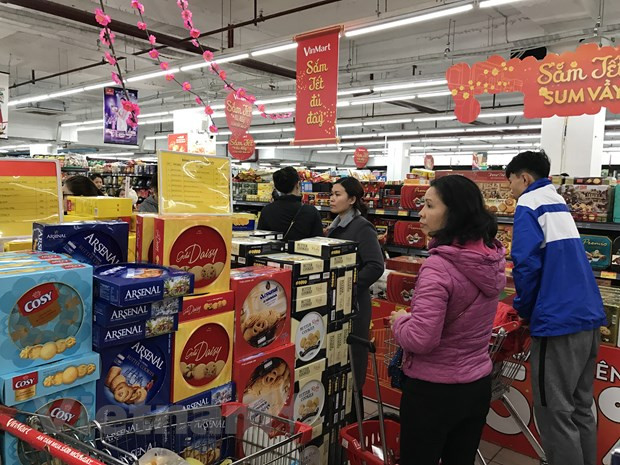 The campaign “Vietnamese people prioritise using Vietnamese goods” has boosted the sale of "Made in Vietnam" products. (Photo: VietnamPlus)
The campaign “Vietnamese people prioritise using Vietnamese goods” has boosted the sale of "Made in Vietnam" products. (Photo: VietnamPlus)
COVID-19 has caused consumers to limit spending, adversely affecting trade, services and goods procurement, while exports to many markets have been interrupted due to prevention and control measures.
In difficult times, the domestic market is always considered a fulcrum and a driving force for the country's economic growth.
According to Le Viet Nga, Deputy Director of the Domestic Market Department under the Ministry of Industry and Trade, said that through the campaign "Vietnamese people prioritise using Vietnamese goods", which has been carried out in the past 10 years, the purchasing power as well as the priority for Vietnamese goods have much increased. This is a very reliable support for businesses to stand firmly in all global financial crises as well as non-financial crises such as the COVID-19 pandemic.
She said during the last anti-COVID-19 period, modern distribution channels and traditional markets have brought into full play their strength in serving the people in the fight against the pandemic while ensuring a safe business and production process.
All modern retail distribution channels have applied the best measures for the supply of goods to ensure food safety.
Remarkably, food has been circulated smoothly from distribution systems to consumers as well as from material areas to distribution systems in the most difficult times, including the social distancing period.
Meanwhile, the traditional market system has also promoted its role of compensating for the distribution of goods that modern distribution systems such as supermarkets and convenience stores cannot do, especially rural and remote areas which see the absence of this modern distribution system.
In addition, supermarket systems have connected with each other to bring goods to mobile selling areas and traditional markets. Amid social distancing, small traders in traditional markets were still allowed to sell essential goods and all had good initiatives for the distribution of goods to ensure food safety, while taking protective measures for consumers when buying goods.
In the past process, to implement the Law on Food Safety, traditional markets and small traders themselves had a very good awareness of food safety.
The Ministry of Industry and Trade has developed a set of national standards for food safety markets which was disseminated nationwide, along with the Health and Population Target Programme, which includes a project on ensuring food safety markets.
 Le Viet Nga and Vinatex representatives at a trade promotion programme for the domestic market. (Photo: VietnamPlus)
Le Viet Nga and Vinatex representatives at a trade promotion programme for the domestic market. (Photo: VietnamPlus)
According to Nga, implementing the campaign "Vietnamese people prioritise using Vietnamese goods" over the past 10 years, the Ministry of Industry and Trade has promoted the connection to sell domestically produced goods, especially quality ones, ensuring food safety towards environmentally friendly standards. Therefore, the supply-demand connection to ensure goods consumption in distribution systems is very important.
She said that the ministry also emphasised solutions on institutional perfection to improve the efficiency of law enforcement in domestic trade activities, focusing on the development of the retail market associated with sustainable development.
Through these systems, supermarkets, trade centers or traditional markets had close links with the Ministry of Industry and Trade or local Department of Industry and Trade to organise programmes to promote consumption of agricultural products in particular and Vietnamese goods in general, especially during the recent anti-pandemic period, thus ensuring the supply of essential goods to people.
According to a Vietnam Fatherland Front survey, through the campaign "Vietnamese people prioritise Vietnamese goods", the purchasing power as well as the priority for Vietnamese goods have much increased. This is a very reliable support for businesses to stand firmly in all global financial crises as well as non-financial crises such as the recent COVID-19 pandemic.
Nga noted that it is essential for ministries and agencies to complete institutions and improve law enforcement to create the healthiest and most open environment that stimulates business investment and goods consumption with suitable programmes for Vietnamese consumers.
Businesses need to offer the best goods to consumers. This is also a special opportunity for companies who have already gained access to foreign markets to introduce domestic consumers to world-class products, she added./.





